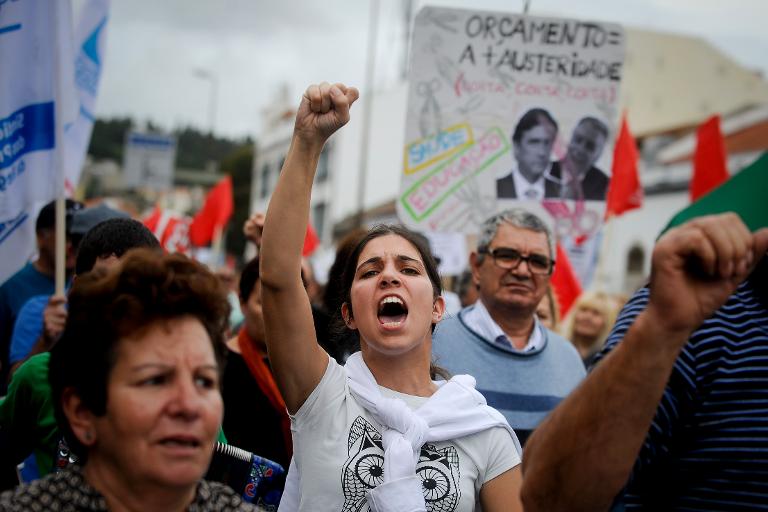
'Troika' in Portugal for new review of bailout
(MENAFN- AFP) Portugal's creditors began a review of the country's 78-billion-euro bailout programme Wednesday with unions and business leaders united against more austerity measures, warning they put a fragile economic recovery at risk.
The arrival of a team of officials from the "troika" of lenders -- the European Commission, the European Central Bank and the International Monetary Fund -- comes just one week after parliament approved a budget for 2014 which aims to save 3.9 billion euros ($5.3 billion).
The savings, to come partly through the cutting public sector salaries and pensions, has provoked street protests.
Portugal secured a 78-billion-euro ($104 billion) economic bailout from the "troika" in May 2011 under a programme that is slated to end in June next year.
The payment of the next instalment of loans of 2.7 billion euros depends on a successful review of the country's progress in implementing economic reforms agreed in exchange for the aid.
While all three of Portugal's main political parties backed the initial bailout agreement, Prime Minister Pedro Passos Coelho's centre-right government has faced a growing backlash against austerity measures.
"It is not by reducing salaries, as some elements of the troika suggest, that we will revive the economy," the head of the Portuguese Industry Confederation, Antonio Saraiva, warned ahead of the visit, adding that such measures would lead to "a brutal drop in household consumption".
IMF experts have backed a reduction in Portugal's minimum wage of 485 euros for youths to encourage companies to hire workers and reduce a jobless rate of 15.6 percent.
"A policy of lower salaries is unacceptable. We hope that the government will make this point to the troika," Lucinda Damaso, the head of Portugal's UGT union, the country's second largest, said Monday during a meeting with government officials.
Finance Minister Maria Luisa Albuquerque agreed with unions, saying wages had already fallen enough in the private sector, in a rare break with the creditors.
"On this issue, we have a difference of opinion with the International Monetary Fund," she said.
Portugal on Tuesday swapped 6.6 billion euros in bonds expiring next year and in 2015 for longer maturities, in an exchange analysts said boosted the country's position ahead of the inspection by its creditors.
"Portugal is now in a better position to negotiate with the troika because the debt swap showed markets are satisfied with it," said David Schautz, credit strategist at Commerzbank.
"The operation increases the chances of seeing Portugal fully return to debt markets" when the bailout programme ends in June 2014, added Paula Carvalho, an economist at Portuguese bank BPI.
In October 2012, Portugal offered a first debt swap programme and in May sold its first long-term debt bond since the bailout, though the operation was largely a test and at a minimised risk to investors.
Portugal has so far received 71.4 billion euros of its bailout and the government has repeatedly insisted that it will not need more help when the programme ends in June, like Greece did when it got a second bailout.
But doubts remain over the government's capacity to put in place the austerity measures included in its 2014 budget.
The budget still needs approval from the Constitutional Court, which triggered a political crisis once before by rejecting tax measures intended to meet bailout terms, and is due to rule in the coming weeks on the proposed cuts to the pensions of public sector workers.
If the measure is turned down by the court, the government will need to propose alternative ways to make the savings.
"If it is rejected, new measures must be found but we have not discussed a Plan B with the government," said Subir Lall, head of the IMF's mission to Portugal.

Legal Disclaimer:
MENAFN provides the
information “as is” without warranty of any kind. We do not accept
any responsibility or liability for the accuracy, content, images,
videos, licenses, completeness, legality, or reliability of the information
contained in this article. If you have any complaints or copyright
issues related to this article, kindly contact the provider above.

















Comments
No comment